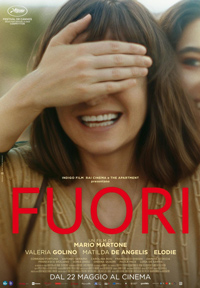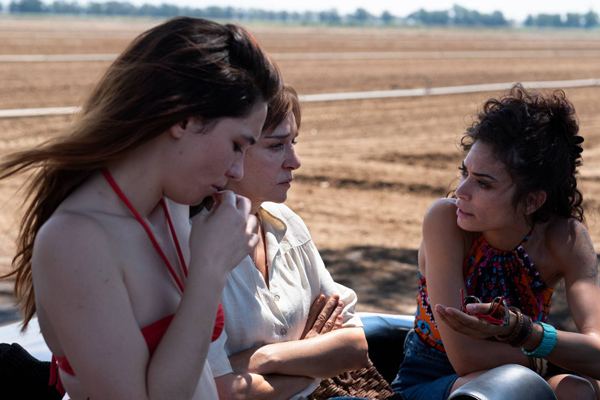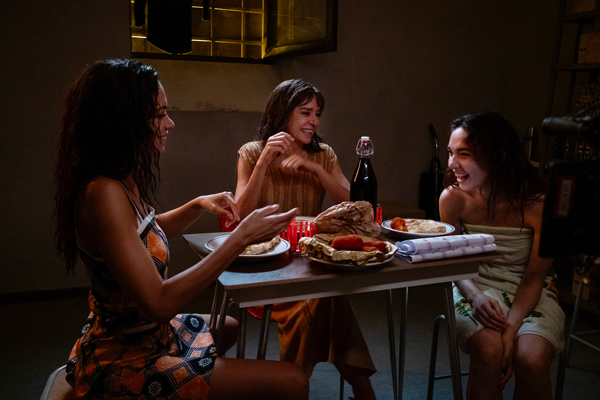Hoosegow Girls: Martone Pays Delicate Tribute to Goliarda Sapienza
 “Never refuse to see the unpleasant aspects of life,” wrote Goliarda Sapienza in her widely regarded masterpiece The Art of Joy, which was published posthumously, decades after her death. A television mini-series adaptation was released in 2024, a majority of the episodes directed by Valeria Golino, who appropriately and fortuitously stars as Sapienza in Mario Martone’s Fuori (which translates to Out in English). Strangely, it’s a film which exists in a transitional ether, and indeed finds its subject in a lulled period of displacement—but it’s not without some sweet spots. We meet Goliarda in Rome, 1980, having recently been released from prison after sentenced for selling stolen jewelry. While serving her time, she makes meaningful connections with several other inmates, one of whom proves to lead to something of a transformative experience for the writer after they’re both released. It’s a quiet, unassuming portrait of Sapienza, and for those being introduced to her for the first time, it may feel like there’s not much to learn. Instead, it’s a subtle glance at a notable woman during a curious moment in a rather exceptionally textured life, which unfolds like the equivalent of a reflective, bittersweet sigh.
“Never refuse to see the unpleasant aspects of life,” wrote Goliarda Sapienza in her widely regarded masterpiece The Art of Joy, which was published posthumously, decades after her death. A television mini-series adaptation was released in 2024, a majority of the episodes directed by Valeria Golino, who appropriately and fortuitously stars as Sapienza in Mario Martone’s Fuori (which translates to Out in English). Strangely, it’s a film which exists in a transitional ether, and indeed finds its subject in a lulled period of displacement—but it’s not without some sweet spots. We meet Goliarda in Rome, 1980, having recently been released from prison after sentenced for selling stolen jewelry. While serving her time, she makes meaningful connections with several other inmates, one of whom proves to lead to something of a transformative experience for the writer after they’re both released. It’s a quiet, unassuming portrait of Sapienza, and for those being introduced to her for the first time, it may feel like there’s not much to learn. Instead, it’s a subtle glance at a notable woman during a curious moment in a rather exceptionally textured life, which unfolds like the equivalent of a reflective, bittersweet sigh.
Goliarda Sapienza (Golina) is on the verge of eviction, having recently been released from prison and needing to find work. However, as a writer of little acclaim, she struggles to make ends meet, sans receiving work as an editor, which is hardly consistent. She’s been trying to get in touch with Roberta (Matilda De Angelis), a mysterious younger woman who seems to be involved in various nefarious activities. They’d met in prison and clearly developed a bond, though it appears to perhaps be one-sided. But Roberta, who begins to trust Goliarda on the outside, soon invites her to participate in her curious world, which includes a number of other women they both met in prison. Goliarda, who has been working on a manuscript for years, only to be continually rejected, opens up to Roberta, eventually revealing the details behind her actions which led to her incarceration.

Sapienza seemingly lived many lives, and her major evolutions as a writer and a woman feels comparable to someone like Anna Kavan, a woman who drastically transformed not only her writing but the essence of herself in ways which add a legendary weight to her publications. The strength of this portrayal rests solely with the prowess of Golino, who is allowed to explore Sapienza exactly at a moment where she’s been estranged from the world as well as herself. A kinship and clearly an attraction to Roberta, who is presented in a heroic chic vein by Matilda De Angelis, provide the most compelling moments. Their relationship unfolds in subtle but effortless ways, which makes the film seem non-specific as regards its subject, but at the same time allows us to explore Sapienza less from a platform and more as an artist on a personal journey. In a way, Fuori plays out more authentically than something chaotically similar such as Paolo Virzi’s Like Crazy (2016), presenting a bond between two women who flee a mental institution and embark on a twee roadtrip. It also brings to mind the fallen women of Antonio Pierangeli’s Adua and Her Friends (1960), at least peripherally, with its handling of Sapienza’s inclusion in a new friend group, including the beautiful Elodie, starring as the beautiful Barbara, similarly entranced by Roberta.

While a surprising change of tone from Martone’s recent output, including The King’s Laughter (2021) and Nostalgia (2022), his latest bears some confusing directorial choices, including the treatment of a Chinese inmate who prepares weekly meals for the women. It’s also impossible to escape the feeling there weren’t some more interesting elements from Sapienza’s life that could have been incorporated, such as her early days as an actress. The opening credits shower us with details about her childhood, homeschooled by anarchist parents during WWII, multiple suicide attempts and rounds of electroshock therapy which seemingly brought her to the shellshocked present of 1980. Mournful but also celebratory, Martone isn’t shying away from the unpleasant aspects of Sapienza’s life, but rather attempting to show how fascinating she was because of them.
Reviewed on May 21st at the 2025 Cannes Film Festival (78th edition) – Competition. 115 Mins.
★★★½/☆☆☆☆☆


